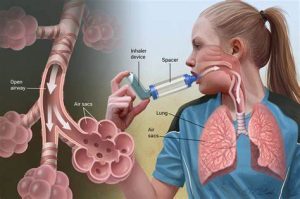Allergies and asthma are both conditions related to the body’s immune system and its reaction to certain triggers.
Allergies occur when the immune system reacts abnormally to substances that are typically harmless to most people. These substances, called allergens, can be found in things like pollen, dust mites, pet dander, certain foods, or insect stings. When an allergic person comes into contact with an allergen, their immune system overreacts, producing antibodies called Immunoglobulin E (IgE) which trigger the release of histamine and other chemicals, leading to allergic symptoms. Common symptoms of allergies include:

- Sneezing
- Runny or stuffy nose
- Itchy or watery eyes
- Skin rashes or hives
- Swelling
- Shortness of breath or wheezing
Asthma is a chronic condition characterized by inflammation and narrowing of the airways, which makes it difficult to breathe. It can be triggered by allergens, respiratory infections, exercise, cold air, or irritants like smoke or strong odors. Symptoms of asthma can vary in severity and may include:
- Shortness of breath
- Chest tightness or pain
- Wheezing
- Coughing, especially at night or early morning
Preventing allergies and asthma involves a combination of avoidance strategies and medical management:
- Identify triggers: Work with a doctor to identify specific allergens or asthma triggers and take steps to avoid them. This may involve allergy testing and keeping a symptom diary to track triggers.
- Allergen avoidance: Take measures to reduce exposure to allergens, such as using allergen-proof bedding, keeping indoor spaces clean and free of dust and mold, and avoiding outdoor activities during high pollen seasons.
- Medications: Allergy medications such as antihistamines, nasal corticosteroids, decongestants, and allergy shots (immunotherapy) can help manage symptoms and reduce the body’s immune response to allergens.
- Asthma management: For asthma, medications such as bronchodilators (to open up airways) and inhaled corticosteroids (to reduce inflammation) are commonly prescribed. It’s important to follow an asthma action plan provided by a healthcare provider to manage symptoms and know when to seek emergency care.
- Lifestyle changes: Avoid smoking and exposure to secondhand smoke, maintain a healthy weight, and exercise regularly (under the guidance of a healthcare provider) to improve lung function and overall health.
- Regular check-ups: Schedule regular appointments with a healthcare provider to monitor symptoms, adjust treatment plans as needed, and receive flu and pneumonia vaccinations to prevent respiratory infections.
By taking these preventive measures and working closely with healthcare providers, individuals with allergies and asthma can effectively manage their symptoms and improve their quality of life.



